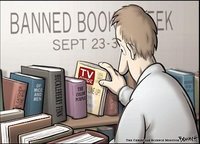 Ashley Sanchez, a writer for the Austin American Statesman suggests discussing the following questions with students in a recent article about ALA's Banned Books Week. Canadians will have to adapt the questions to our society.
Ashley Sanchez, a writer for the Austin American Statesman suggests discussing the following questions with students in a recent article about ALA's Banned Books Week. Canadians will have to adapt the questions to our society.•In what countries have books been banned?
•Given that people can legally own and read books in this country, what does book banning mean here?
•Does challenging a book's suitability in a particular setting or for a particular age group threaten our republic? Explain your answer.
•What motives might prompt organizations (the American Library Association and the American Booksellers Association, among others) to sponsor Banned Book Week?
•Is a book better or more worth reading simply because it has been challenged? Why or why not?
•What forces contribute to the rising number of book challenges? Explore possibilities such as a greater number of meddlesome, intolerant parents and the inclusion of increasingly vulgar, sexually explicit and violent books in school classrooms and libraries.
•What standards should be used to evaluate books marketed to children and teens? Should those books that would earn an R-rating if they were made into a movie also require parental consent before being read by students under 18? Why or why not?
•Is a book good simply because it depicts realistic actions or situations? Are there any real-life things that students are better served by not being exposed to in graphic detail?
•Whom should students believe: their parents who think a particular book is inappropriate for them, or the teachers, librarians or authors who believe it's OK?
•Because majorities readily agree that some books that have been challenged shouldn't have been, does it follow that no books should be challenged? Conversely, should a book automatically be suspect because someone challenged it?
Banned Books Week cartoon from the Christian Science Monitor.
No comments:
Post a Comment